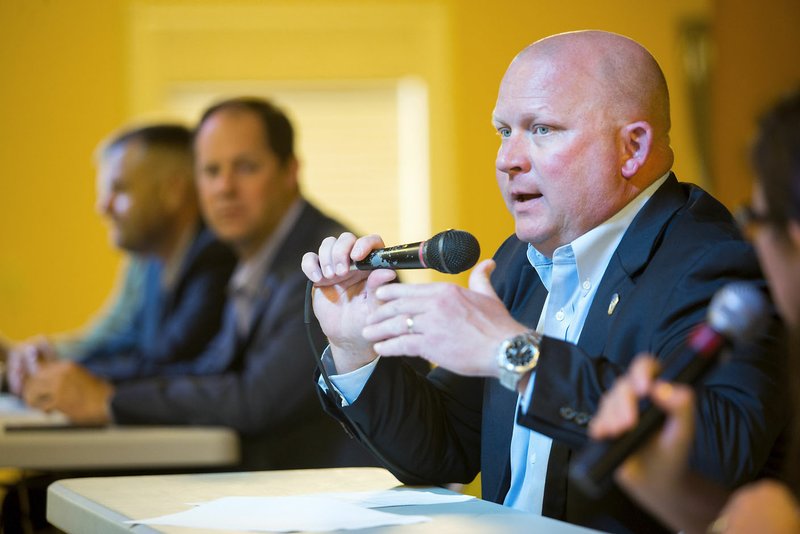ROGERS -- Sonya Rodriguez believes it's important to bridge gaps between Rogers police and the minority community.
"We need to bridge any difference between the police and our community," said Rodriguez, the assistant pastor of Centro Cristiano de Rogers. "There needs to be more unity and understanding on how things work. People need to be more informed so they don't react to rumors."
At a glance
Section 287(g) of the Immigration and Nationality Act for two decades has allowed police and sheriff’s departments to screen people for immigration violations in the field, at local jails or both, essentially giving local officers federal powers. The field aspect is referred to as the task force option, while screenings only after an arrest at the jail is the detention option.
The church hosted a community meeting with Rogers police officials Thursday night.
The Rogers Police Department has been involved in 10 to 12 meetings focused on the minority community since 2012, Rogers Police Chief Hayes Minor said.
Rodriguez believes it's important for the community to hear from their police officers to gain a better understanding of the police and how they work.
Minor brought statistics with him to show his department isn't targeting any minority group.
Rogers police officers made 5,500 arrests in 2016, Minor said. According to Minor, the racial makeup of the arrests are 4,400 whites, 1,300 Hispanics, 300 blacks, 115 Asians and the rest include other racial groups. Minor said police used force 32 times last year.
Minor said police searched 513 vehicles last year which involved 324 white drivers, 147 Hispanics drivers and the remaining 37 searched included other races.
According to Minor, Rogers police did 13,000 traffic stops last year and wrote 6,700 tickets and 6,000 warnings. Seventy percent of those ticketed were to white drivers while 24 percent were Hispanic drivers and the remaining 6 percent was of other races.
Minor said the statistics show his officers' actions aren't being guided by race.
Minor answered questions from several people for almost two hours. The questions dealt with immigration issues, racial profiling and body cameras.
Manuel Stopani said he has a couple of undocumented friends who fear paying tickets because they fear they may be deported.
"We do not try to conduct immigration enforcement through traffic enforcement because everyone get tickets," Minor said.
Minor said people should pay their tickets and avoid extended court appearances. Minor said people have a right to go to court, but he stressed people shouldn't ignore the ticket and miss court.
Minor said a warrant will be issued for a person's arrest and and their fingerprints could end up in the system and the federal government may check fingerprints for undocumented individuals.
"Immigration is important to a lot of people in Rogers," Minor said. "We have a good record of cooperating with federal authorities and will continue to do so, but we don't take any enforcement on your immigration status."
Minor said Rogers police officers don't ask victims of crime or drivers their immigration status.
Several other questions also dealt with immigration.
Minor reiterated his department doesn't enforce immigration laws. He also said his department doesn't keep statistics concerning the deportation of any individuals.
Some people questioned Minor about the Benton County Sheriff's Office and Rogers police involvement with the 287(g) program. Minor said the department no longer participates with the program and he had no control of any policies at the Sheriff's Office.
One question also concerned whether people can record their interaction with police. Minor said the recordings are legal, but the officer is wearing a microphone and the camera in his car is recording those interactions.
The man wanted to know whether Rogers police will be getting body cameras.
Minor said there are no immediate plans to purchase body cameras. Minor cited the expense and said privacy issues with body cameras needed to be resolved.
"I think they are good tools, but body cameras are not the final solution to make everything good between police and the community," Minor said.
One man wanted to know if he would be arrested if he went to pay a ticket for having no license. He wanted to know how many chances or tickets he could get before going to jail.
Minor told the man that decision rested with the judge.
"I think they're important because it gives us an opportunity to address issues that are specific to the minority community in a setting that is free from the pressures of a traffic stop and crime scenes," Minor said. "These meetings also give us an opportunity to hear directly from the minority community about their concerns, address rumors, and share with them facts about the activities undertaken by the department"
NW News on 04/21/2017

